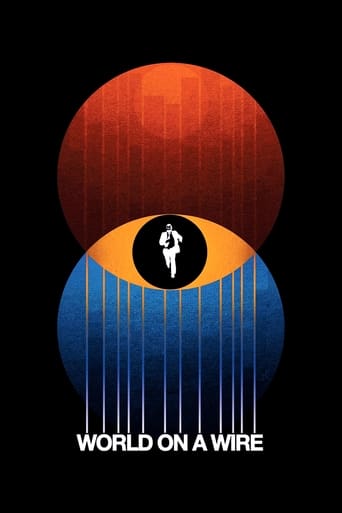Roedy Green
Imagine you were a young film-maker, who lived in Germany in the olden days, before the adoption of the Selectric typewriter. You had no budget. Your costumes had to come from attics and thrift stores. No CGI, no stunts, no special effects, no sets. About all you could afford is some make-up, wigs and fake beards. You could not even afford professional lighting, but you had an idea for a subtle scifi film. You were however, able to persuade a number of wealthy people that filming in their homes would bestow prestige. How could you get someone to fund the movie? You might make a prototype proof of concept picture, like a visual screenplay.That would be this film. However, actually, it was 1973 and Rainer Werner Fassbinder had already made 21 films. West German TV funded it. Perhaps there is another explanation for the amateurishness.To appreciate it, you really have to use your imagination to ignore the loud checked jackets and secretaries wearing dresses last worn by saloon dancers, and the absurd hairstyles.It is in German. The voices are very clear. It is surprising how many individual words you can understand in German with hints from the sub titles. However, all other sound is muddy.Actors mostly say things that don't seem to make any sense, or that are coherent but apparently irrelevant. The characters are just as puzzled as you about what is going on. The total effect though does create a complex alternate reality.One thing the film explores, quite an issue for gay men, is the way the physical appearance of others has such a strong power over us.The pace is slow. There is a lot of padding. Somebody might edit it down to make a more coherent film.It is a clever film, but not an enjoyable one. I know Roger Ebert gave it 3 stars, but I found it very boring, but then I consider Last Year at Marienbad the worst film I have ever seen. So what do I know? I even think the Matrix is a much better realisation of a similar idea.
Perception_de_Ambiguity
The SF premise isn't unique (although it pretty much was back then), but the focus is a completely different one than in other artificial reality films. Especially during the first part it is an elaborate crime picture, that uses the SF premise to tell an unusual crime story in which the forced detective tries to solve a mystery with the obstacle of vanishing characters and unhelpful witnesses who don't have to lie to be unhelpful. Instead of an unreliable narrator we have an unreliable world.In part two we follow the main character's struggle for sanity and it turns more into a psychological examination of a character in an extreme situation. He knows his very existence is nothing more than electrical impulses, how does he deal with this knowledge? He knows that there is a world that is more real than his, but he is trapped in an artificial world, a world where nobody can understand him. The problem of thinking of knowing something essential about the world that nobody else knows or wants to believe is a very real one that many of us can identify with. For me the film transports this hopelessness very well, with its dreary, artificial atmosphere which also supports the factual artificiality of the film's world.Other than 'The Matrix' or 'The Thirteenth Floor' it's little concerned with evoking a sense of awe for its artificial reality plot, instead it very much focuses on the psychological aspects. Philosophy is only in so far interesting in that certain philosophical concepts are essential in how they shape and alter the character's perception of the world.Arguably it is longer than it has to be (which isn't a problem if you are as captivated by it as I was) and part 2 runs pretty low on steam.
trakl
First of all, this film is nearly impossible to get a grip on, but the upcoming Fassbinder DVD-Collection (Code 2!) hopefully includes this one. If you are fond of virtual reality stories (and capable of understanding the German language) you might want to look for a video-hunt. This film is truly fascinating, with a great cast of famous (and sometimes notorious...) German actors. It foreshadows everything about VR - because it is the first adaption of the novel "Simulacron", on which "13th Floor" is based as well. "Welt am Draht" is brilliantly shot by Michael Ballhaus and Ulrich Prinz. Although I am not a fan of Fassbinder's works, I really liked the eerie atmosphere and the hilarious 70's design.Rating 9/10!
paragate
I saw Welt am Draht in German TV when it was broadcast first, sometime 1973 or 74 i guess. I was nine or ten years old then, and it left a tremendous impression on me -- World On Wires is definitely one of my Myths of Childhood.The two or three parts were aired again two or three times, the last time i watched it must have been in the eighties. I recorded them, but, very unfortunately, somehow these tapes got lost in the eddies of reality. It is hard to impossible to find Welt am Draht anywhere these days, which is really sad.Welt am Draht changed the way i perceive the world. It is its credibility, the haunting story, the atmosphere of Germany in the early seventies, the actors, everything. It was very up to date then, and i think it is very much so now. We used to watch a lot of SF on TV, and I remember several serials that were in atmosphere and outlook so close to RWF's Welt, it has almost all melted into a kind of emotion, some sort of dim remembrance of future.

